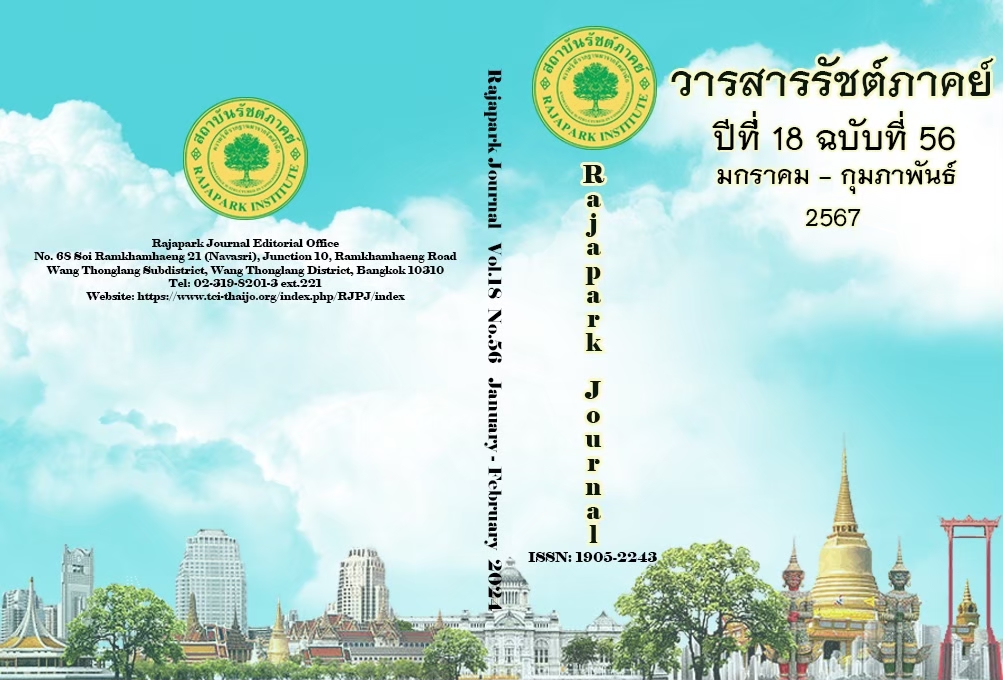Problems and Measures From Granting Witness Immunity of Law Enforcement Agencies
Main Article Content
Abstract
Due to legal provisions in Thailand, some enactments grant authorities the power to take individuals as witnesses in various statutes, including the police regulations on cases
in Section 8, Chapter 7 of the National Police Office, Sections 257 and 258, and regulations of the Office of the Attorney General concerning the Criminal Proceedings of Public Prosecutors, B.E. 2563 (2020). These provisions dictate the taking of suspects as witnesses, as outlined
in Section 2, Chapter 10, Article 81, regarding taking a suspect as a witness, and Article 82, regarding the interrogation of a suspect issued a non-prosecution order as a witness. The legal provision empowers law enforcement officers to take individuals as witnesses in other special cases, as follows: the Anti-Participation in Transnational Organized Crime Act B.E. 2556 (2013), Section 23; The Organic Act on Anti-Corruption, B.E. 2561 (2018), regarding the prevention and suppression of corruption, Section 135; and the National Anti-Corruption Commission's Announcement on criteria, methods, and conditions for taking individuals as witnesses without initiating legal proceedings, B.E. 2561 (2018), Section 5; executive measures in the Anti-Corruption Act, B.E. 2551 (2008), Section 58; and the Announcement of the Public Sector Anti-Corruption Commission to prevent and suppress corruption in the public sector about criteria, methods, and conditions for excluding a person or the accused from being a witness without prosecution, B.E. 2560 (2017). This article has the objective of studying the problem of deprivation of persons as witnesses according to Thai legal concepts and theories regarding personal protection. As a witness and the criteria and procedures for revoking a person as a witness, it is recommended to enact measures for taking individuals as witnesses, explicitly stipulated within the Criminal Procedure Code, from Section 136/1 to Section 136/5. Additionally, supplementary regulations for other special cases should be included in the criminal procedural law, providing provisions for using such measures in various types of cases. However, this should be subject to the condition that there is no other available primary evidence to prosecute the offender, taking into consideration the criteria, conditions, and practices adopted by other countries.
Article Details

This work is licensed under a Creative Commons Attribution-NonCommercial-NoDerivatives 4.0 International License.
Views and opinions appearing in the Journal it is the responsibility of the author of the article, and does not constitute the view and responsibility of the editorial team.
References
Beccaria, C. (1986). On Crimes and Punishments (Translated, Devid Young). Hackett.
Chuathai, S. (1995). Philosophy of Law. Winyuchon.
Kwanmuang, K. (2007). Advanced Criminal Law. Winyuchon.
Levy, L. W. (1968). Origins of the Fifth Amendment. Oxford University.
Markman, S. J. (1986). Miranda v. Arizona: A Historical Perspective. American Criminal Law Review, 24, 193.
Meenakanit, T. (1987). Offences to Theft. Journal of Law, 2(16), 36-37.
Na Nakhon, K. (2010). General Criminal Law (4th ed.). Winyuchon.
Nirasanaphapai, P. (2022). Granting Immunity for Prosecution to the Accomplices or Suspects in Special Cases for the Purpose of Legal Development. Department of Special Investigation, Ministry of Justice.
Phakharat, W. (2012). Legal State and Rule of Law. https://www.senate.go.th/assets/portals/93/fileups/272/files/S%E0%B9%88ub_Jun/3journal/b142%20jul_9_1.pdf
Phonkul, P. (2003, January 6). Legal State and Civil Society. Public Law Net. http://public-law.net/publaw/view.aspx?id=651
Polaratana, K. (1991). The Application of the Procedure of Excluding Accomplices to the Investigation of the Commission of Counter Corruption[Master’s thesis, Chulalongkorn University].
Srisanit, P., Komlarachun, K., Sornrat, N., & Bunmee, R. (2020). Developing Legal Measures to Prevent and Suppress Corruption. Thailand Science Research and Innovation (TSRI).
Stone, J. (1950). The Province and Function of Law. Harvard University.
Suwadikul, U. (2013). Seeking Evidence in Special Cases: The Study of Immunity from Prosecution in Exchange for the Implicated Testimony of the Accused[Master’s thesis, Dhurakij University].
Tangsripairot, P. (2014, April, 28). Guidelines for Investigating Cases where Investigators Deter Offenders or the Accused is a Witness, and the Law does not Prohibit Listening to the Complaints of those Who Participated in the Crime or the Accused. Department of Special Investigation: DSI. https://www.dsi.go.th
Timsuwan, S. (1981). The Public Prosecution Department and the Prosecution of Criminal Cases for the State. National Defence College of Thailand.


